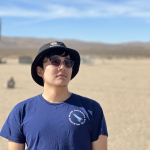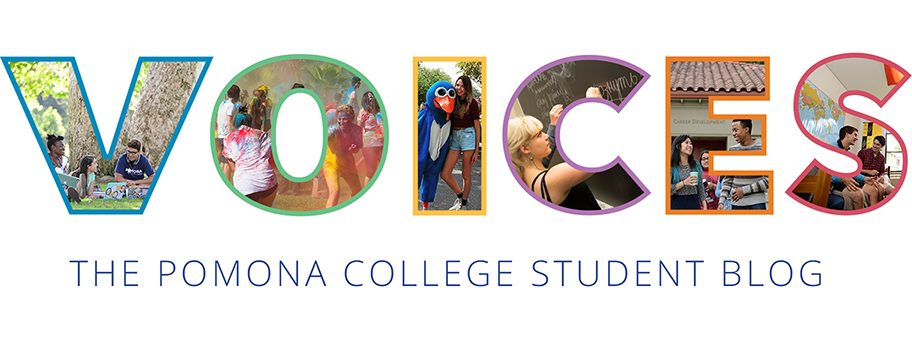Featuring Kevin Song HMC ’24
By Hayeon Lee ’23
Kevin Song HMC ’24 and Hayeon Lee POM ’23 competing at FAR for the Mudd Amateur Rocketry Team.
They’re the two students at the end, NOT looking at the camera.
Hi everyone! This is Hayeon Lee, a current senior English and Politics major attending Pomona College. I will interview a 5C student about a topic in this article series and show the back-and-forth dialogue. This week’s theme is internships and jobs, and we have Kevin Song here with us today!
Could you give us an introduction?
Kevin: Hey, everyone! My name is Kevin Song. I am a junior at Mudd, and I am an engineering major. My hobbies tend to change, but my current hobbies are bouldering, skating, and occasionally checking my failed stocks.
Hayeon: My name is Hayeon Lee. I am a current senior at Pomona College and double majoring in English and Politics. My current hobbies are playing video games, bouldering, and writing.
Could you tell us about your academic journey?
 Kevin: I’ve always liked science, and I’ve always liked the application part of science. Engineering is the application of STEM to real-life situations and the perfect tool to use to solve problems. It’s also the perfect tool for invention and creation. After searching “top engineering schools” in my senior year of high school, Harvey Mudd College popped up. I liked the curriculum, size, and that you could take classes at the other 5Cs.
Kevin: I’ve always liked science, and I’ve always liked the application part of science. Engineering is the application of STEM to real-life situations and the perfect tool to use to solve problems. It’s also the perfect tool for invention and creation. After searching “top engineering schools” in my senior year of high school, Harvey Mudd College popped up. I liked the curriculum, size, and that you could take classes at the other 5Cs.
Hayeon: I write about this in “Coming Back Home.” I spent four years in Connecticut for high school and decided that I wanted to come back home or near Los Angeles. When looking at different English and Politics departments, I saw Pomona’s curriculum and professors and decided to apply.
Harvey Mudd’s engineering program is a general engineering program. Could you expand and explain what that means? What are some pros and cons?
Kevin: There are many forms of engineering such as mechanical, electrical, industrial, systems, and so on. Rather than specifying which engineering you want to learn in your undergraduate years, you can learn a variety of different approaches to solving engineering problems. At Harvey Mudd, you also take technical electives in different fields such as industrial, fluid dynamics, and so on for further expertise and depth. In whatever engineering role in whatever company you are working for, you’re able to communicate with other engineers outside of your field. You also learn a massive amount of information in all of your classes.
Some cons would be that the degree ‘General Engineering’ might not mean anything to the recruiters when you’re applying to jobs. You have to prove to the recruiter that you have a depth of knowledge in whatever field you’re applying to. You would have to prove this through your projects, the technical electives, and your previous internships and research.
What are some of the most difficult aspects of your major? Vice versa, what do you enjoy about your major?
Kevin: The workload is nothing to laugh about. The amount of core requirements that Mudd requires engineering majors to take is a lot of classes. You have to grind on weekends, and most of your time outside class will be spent grinding on homework on the weekdays. Despite this, I came in knowing the workload, and my passion for engineering outweighs these cons.
Hayeon: I think that sometimes both my majors are very subjective. Frequently, there is no ‘right’ answer for English or Politics, and at times, you have to guess what your professor wants. I also think that I’m constantly in go-mode due to two writing-intensive majors. If I’m not writing an essay for one class, I’m editing an essay or a speech for another class. However, I do enjoy writing, and that is why I chose these two majors. I guess it would be a double-edged sword.
So today’s main topic is internships! Could you briefly tell us about your internship journey?
Kevin: The first internship I had was after freshman year. I worked as a data science intern at Klaviyo. It was well-paying but a little bit out of the scope of my degree and passions. The second internship was during the summer after my sophomore year as part of the Riggs Fellowship in manufacturing management. I worked with a team of five students, and we worked at Amatek Ameron and WePackItAll. We were working as industrial engineers. Utilizing lean manufacturing methodology, we helped to optimize their manufacturing in requested departments. This internship was more aligned with my degree and perhaps what I want to do post-grad.
On campus, I have worked as a Makerspace steward and as a lab proctor for E79, a beginner engineering course at Harvey Mudd College.
Hayeon: I worked two internships in the summer after my freshman year. One was with PAYS (Pomona College Academy for Youth Success) as a Teaching Advisor and the other was as a Communications Intern for the National Council for Community and Education Partnerships. Both were virtual, and the experiences helped me narrow down what I wanted to do post-grad. In the summer after my junior year, I worked as a Writing Tutor and an Office Assistant for PAYS.
What was the most memorable internship, and why?
Kevin: The Riggs fellowship was the most memorable past internship. It was a high stake, high-responsibility internship, and there were a lot of things that I learned throughout the internship. Having hands-on experience with concepts that I learned in class was a lot of fun.
Hayeon: My most memorable internship would be with NCCEP as their communications intern. Although it was online, I felt fully supported by the NCCEP team and had a lot of responsibility managing social media handles, editing, and doing anything else that fell through the cracks. I realized that communications work and project management work are something that I love doing, and I hope to pursue that post-grad.
What are some challenges that you’ve faced in your internships?
Kevin: When you set a goal and you try to reach those goals, there is a lot of pressure to fulfill those expectations. In my Riggs fellowship, we had to spend a lot of outside hours thinking about what we had to do to reach our goals. Sometimes the scope of the project is very large, but there is just not enough time in the internship to hit all of our goals. Learning how to pivot and change your path to prioritize goals and expectations was something that I learned.
Also, in the Riggs fellowship, we are working with the company team directly. A part of the challenge is to convince the board that your idea works and persuade them to be on board.
Hayeon: Like Kevin, I learned how to balance managing people, deadlines, bosses, company goals, and my mental health. Finding that balance was something that I had to figure out, and, like Kevin, learning how to pivot and reorient goals was something that I had to perfect.
What are some of the challenges you have faced when it comes to finding jobs and internships?
Kevin: Personally, I am unsure about what field of engineering to break into. Having to decide this now makes it a little bit difficult to search for internships, as my interest is broad. I hope to figure this out, as I take more specific courses and during my next internship in senior summer.
Hayeon: A lot of companies right now are looking for students with a “technical” degree, whether it be Computer Science, Engineering, Accounting, or so on. As an English and Politics major, I have to prove to recruiters that my non-technical degree is applicable to whatever field I am applying to.
What are your post-graduate plans?
Kevin: I plan to go straight into the work field. I am unsure about which engineering field, but hopefully, I can figure that out by my senior year.
Hayeon: I am currently leaving my options open and applying to both MFA programs and full-time jobs.
What recommendations might you have for incoming first years, current first years, and sophomores about internships and jobs?
Kevin: Take engineering core and technical electives earlier to figure out what you might want to branch off into within engineering. Time management is always key, and effectively learning the material in class in a time-efficient manner is also important. As for internships and jobs, look into as many opportunities as possible, use and develop connections at the 5Cs, and start talking to your professors early about their experience.
Hayeon: Don’t decide on your major too early. I don’t regret my choice to become an English and Politics major, but I wish I had taken more courses outside my major during my freshman year. Don’t box yourself into one major and one field; even if you think you’re not interested in the field, try taking courses to see how it is!

